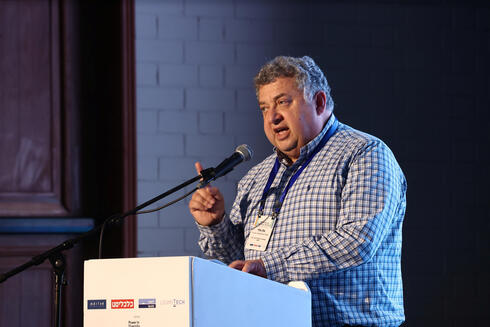
"If we want to build teams or organizations that are capable of innovation, we need diversity"
Alan Feld, Founder and Managing General Partner of Vintage Investment Partners and founder of the Power in Diversity initiative, described how diversity of employees can improve the bottom line of companies. "A team that encompasses a wider range of skills can deal more effectively with all the challenges it encounters”
"What do we mean when we talk about diversity in the workplace?" Alan Feld, Founding Partner of Vintage Investment Partners and founder of the Power in Diversity initiative, asked the audience at the high-tech diversity conference organized by Calcalist, Bank Leumi and Meitar in collaboration with Power in Diversity. "Usually the intention is that the organization's staff reflects the general composition of the society around it. The idea is simple, but achieving it requires intention and focus in order to overcome systemic and personal biases, which over the years have pushed aside many parts of society.
"Unfortunately, even the mention of the word 'diversity' can lead to anxiety and conflict. People are afraid. They fear that social diversity in a group will cause discomfort, unpleasant interactions, distrust, more noticeable interpersonal conflict, more problematic communication, more worry from lack of respect and other problems. So what's the advantage of diversity?
"If we want to build teams or organizations that are capable of innovation, we need diversity," Feld said. "Diversity increases creativity, encourages the search for new information and perspectives, which leads to better decisions and creative solutions. Diversity can improve the bottom line of companies and lead to breakthrough innovations. Exposure to diversity can even change the way we think.
"A U.S. survey found that 85% of CEOs said a diverse workforce improved their bottom line. Forbes Insights found that companies with diverse management teams enjoy 19% higher revenue. Diverse companies are 1.7 times more likely to be leaders in their market segments. In 2014, two researchers from Harvard University examined the ethnic identity of the authors of 1.5 million scientific articles written between 1985 and 2008 and found that articles written by diverse groups received more citations and had a higher impact than articles written by people from the same ethnic group.
Related articles:
"It makes sense. Any team that encompasses a wider range of skills and experiences will be able to more effectively tackle whatever business challenges they encounter. Diverse teams bring a wider range of information and perspectives to the table, which leads to better decision-making and better overall results. People who differ from each other in race, gender and other dimensions, bring unique information and experiences to the task at hand. A male and female engineer may have different perspectives from each other like an engineer and a physicist."
"Then why do so few companies in this country have diverse employees?" Feld asked. He believes that prejudice is the main reason for the lack of diversity. "If we want to build a diverse workforce, we need recruitment practices without bias towards individuals or groups. Recruitment is always based on merit, looking to identify the best candidate, to ensure that every qualified candidate gets an equal opportunity to be selected, regardless of his or her background. As recruitment becomes more widespread and more deeply rooted, it constitutes a significant step towards establishing true equality in the workplace.
"When I founded 'Power In Diversity' seven years ago, it was after ten years of working in projects related to Haredi employment. Experienced and talented Haredi candidates were not hired by the big technology companies - not because of their lack of skills, but because they were Haredim. The deeper I delved into it, I discovered it was also true for women, members of the Arab community, Ethiopians, people with disabilities, LGBT people, older people and others.
"The most common answer I heard is, 'We were unable to find diverse people with the necessary skills,'" Feld said. "In my opinion, the issue was not a supply of high-quality diverse candidates, but the demand for them. They were simply afraid to hire them. So diversity is not easy and it's not automatic. We have to work on it and for it."
